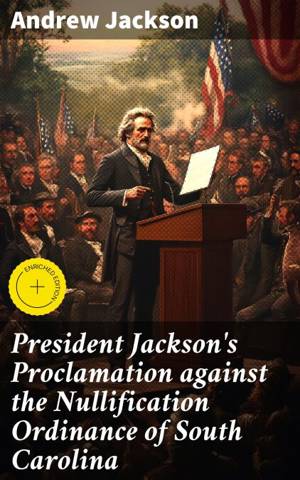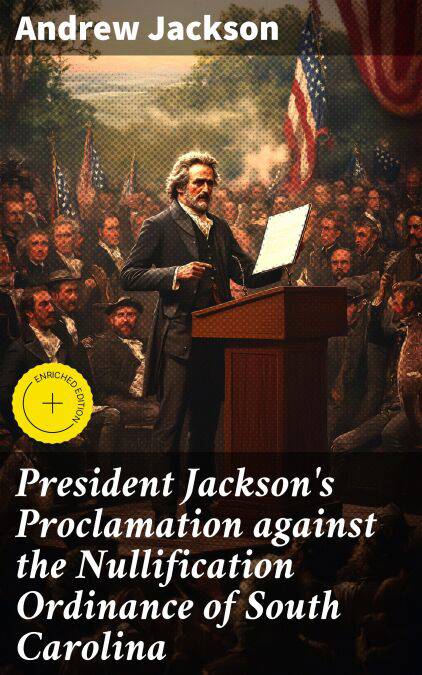
- Afhalen na 1 uur in een winkel met voorraad
- Gratis thuislevering in België vanaf € 30
- Ruim aanbod met 7 miljoen producten
- Afhalen na 1 uur in een winkel met voorraad
- Gratis thuislevering in België vanaf € 30
- Ruim aanbod met 7 miljoen producten
Zoeken
President Jackson's Proclamation against the Nullification Ordinance of South Carolina E-BOOK
Enriched edition. Defending Federal Supremacy: Jackson's Stand Against Nullification
Andrew Jackson
E-book | Engels
€ 1,99
+ 1 punten
Omschrijving
In his pivotal work, "President Jackson's Proclamation against the Nullification Ordinance of South Carolina," Andrew Jackson addresses the profound constitutional crisis posed by South Carolina's assertion of state sovereignty over federal laws. Written in a direct and forceful style, the proclamation articulates the dangers of nullification, situating it within the broader context of the early 19th century American political landscape. Jackson's poignant rhetoric underscores his unwavering commitment to preserving the Union, framing the ordinance as a threat not only to federal authority but also to the very fabric of national unity. This proclamation serves as a vital historical document revealing the tensions that characterized antebellum America, particularly regarding state rights versus federal governance. Andrew Jackson, the seventh President of the United States, was shaped by a turbulent era marked by rapid expansion and contentious debates over federalism. His own experiences as a military leader and populist figure influenced his staunch opposition to nullification, illustrating his belief in a strong national government. Jackson's presidency, often regarded as a clarion call for the common man, positioned him as a defender of the Union against the encroaching specter of disunion. This proclamation is essential reading for anyone interested in American history, federalism, and the evolution of political thought. Jackson's impassioned defense of national integrity makes it a compelling study for scholars and lay readers alike, revealing the complexities of governance during a crucial period in U.S. history.
In this enriched edition, we have carefully created added value for your reading experience:
- A succinct Introduction situates the work's timeless appeal and themes.
- The Synopsis outlines the central plot, highlighting key developments without spoiling critical twists.
- A detailed Historical Context immerses you in the era's events and influences that shaped the writing.
- An Author Biography reveals milestones in the author's life, illuminating the personal insights behind the text.
- A thorough Analysis dissects symbols, motifs, and character arcs to unearth underlying meanings.
- Reflection questions prompt you to engage personally with the work's messages, connecting them to modern life.
- Hand‐picked Memorable Quotes shine a spotlight on moments of literary brilliance.
- Interactive footnotes clarify unusual references, historical allusions, and archaic phrases for an effortless, more informed read.
In this enriched edition, we have carefully created added value for your reading experience:
- A succinct Introduction situates the work's timeless appeal and themes.
- The Synopsis outlines the central plot, highlighting key developments without spoiling critical twists.
- A detailed Historical Context immerses you in the era's events and influences that shaped the writing.
- An Author Biography reveals milestones in the author's life, illuminating the personal insights behind the text.
- A thorough Analysis dissects symbols, motifs, and character arcs to unearth underlying meanings.
- Reflection questions prompt you to engage personally with the work's messages, connecting them to modern life.
- Hand‐picked Memorable Quotes shine a spotlight on moments of literary brilliance.
- Interactive footnotes clarify unusual references, historical allusions, and archaic phrases for an effortless, more informed read.
Specificaties
Betrokkenen
- Auteur(s):
- Uitgeverij:
Inhoud
- Aantal bladzijden:
- 23
- Taal:
- Engels
Eigenschappen
- Productcode (EAN):
- 4064066070618
- Verschijningsdatum:
- 7/12/2020
- Uitvoering:
- E-book
- Beveiligd met:
- Digital watermarking
- Formaat:
- ePub

Alleen bij Standaard Boekhandel
+ 1 punten op je klantenkaart van Standaard Boekhandel
Beoordelingen
We publiceren alleen reviews die voldoen aan de voorwaarden voor reviews. Bekijk onze voorwaarden voor reviews.








